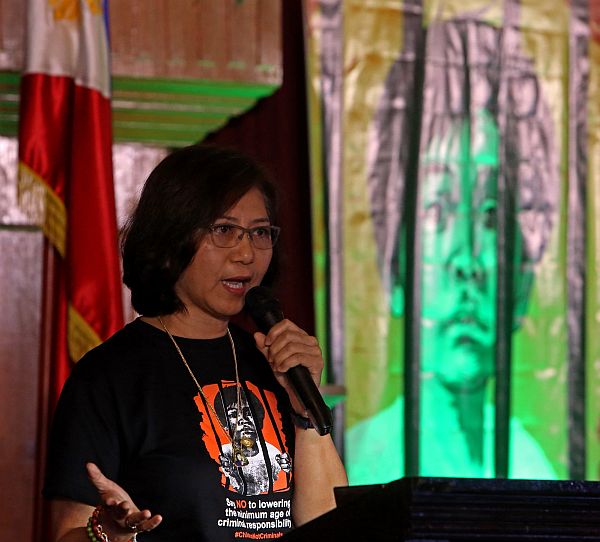
Rep. Jocelyn Sy-Limkaichong (Negros, 1st district) discusses the proposed House bill which lowers the minimum age of criminal liability from 15 to 9 during a forum at the Capitol. She was one of the speakers of the forum.
CDN PHOTO/LITO TECSON)
House move to lower minimum age of criminal responsibility opposed
When he was 11 years old, Gerard (not his real name), together with his friends, was involved in stealing incidents and would sometimes get caught and spend their nights detained at the Fuente Police Station.
In one incident, he claimed that he and his friends were made to kneel inside the station from midnight to 3 a.m. with police officers occasionally beating their legs with their night sticks to force them to return the jewelry that they stole.
“After spending nights in jail, I continued stealing and committed more crimes (including using drugs), and (I) was not afraid of going to jail,” said Gerard.
Gerard, who together with his three other siblings was being raised by a single mother, then felt that he had no future until in 2014, when he reached 17, he was sent to an after-care facility in Liloan town in northern Cebu.
It was there where he was encouraged to seek higher learning. A year later, he availed of the Department of Education’s Alternative Learning System (ALS), a move that has changed his life.
Today, Gerard is a Cebu City university scholar taking up a Bachelor of Arts in Psychology.
Gerard, who attended yesterday’s “I Know Rights?” forum, shared his life story with the participants of the forum held at the Cebu Provincial Capitol’s social hall.
The forum aimed to raise awareness and to prevent the House move to lower the minimum age of criminal responsibility from 15 to 9 years old.
The bill will make the 9-year-old child criminally liable if the child offender “is determined to have acted with discernment” in committing the crime.
Gerard said that children in conflict with the law need compassion.
“These children do not need jail. What they need is guidance and care,” he said.
Eppie Partosa, Regional Rehabilitation Center for Youth (RRCY) head, said that lowering the minimum age of criminal responsibility would not help these children.
Partosa said local government units (LGUs) should instead have social workers that would focus on these children and out of school youth, who are in conflict with the law.
“These social workers can help and guide (these) children. This can help these children from committing crimes, since they will be guided and taken care of,” she said.
In Cebu, the cities of Cebu, Talisay, Naga, Carcar and Danao have these social workers, who focus on these children.
Lawyer Catherine Alvarez of the Humanitarian Legal Assistance Foundation, who also attended the forum, said that the Juvenile Justice and Welfare Act (JJWA) of 2006 should first be implemented well because this would provide a separate justice system for children in the Philippines.